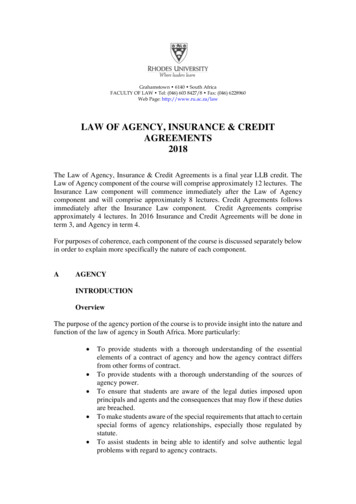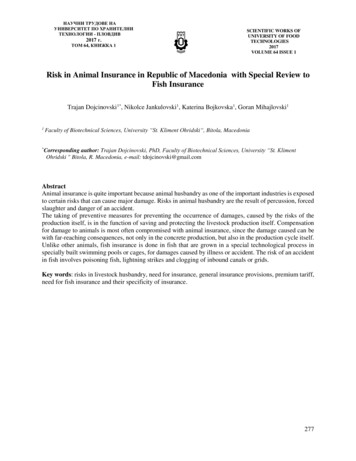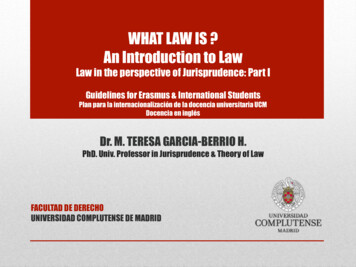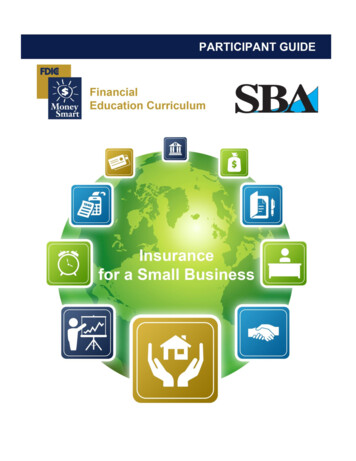
Transcription
Grahamstown 6140 South AfricaFACULTY OF LAW Tel: (046) 603 8427/8 Fax: (046) 6228960Web Page: http://www.ru.ac.za/lawLAW OF AGENCY, INSURANCE & CREDITAGREEMENTS2018The Law of Agency, Insurance & Credit Agreements is a final year LLB credit. TheLaw of Agency component of the course will comprise approximately 12 lectures. TheInsurance Law component will commence immediately after the Law of Agencycomponent and will comprise approximately 8 lectures. Credit Agreements followsimmediately after the Insurance Law component. Credit Agreements compriseapproximately 4 lectures. In 2016 Insurance and Credit Agreements will be done interm 3, and Agency in term 4.For purposes of coherence, each component of the course is discussed separately belowin order to explain more specifically the nature of each component.AAGENCYINTRODUCTIONOverviewThe purpose of the agency portion of the course is to provide insight into the nature andfunction of the law of agency in South Africa. More particularly: To provide students with a thorough understanding of the essentialelements of a contract of agency and how the agency contract differsfrom other forms of contract.To provide students with a thorough understanding of the sources ofagency power.To ensure that students are aware of the legal duties imposed uponprincipals and agents and the consequences that may flow if these dutiesare breached.To make students aware of the special requirements that attach to certainspecial forms of agency relationships, especially those regulated bystatute.To assist students in being able to identify and solve authentic legalproblems with regard to agency contracts.
To familiarise students with legal concepts and terminology commonlyencountered in the law of agency.Credit Value5 Credits.Assumptions of Prior LearningIn order to successfully complete this portion of the course, students must be able to: Write and communicate in coherent English.Know how and where to access resources such as textbooks, law reportsand statutes in the Law Library.Have a working knowledge of the general principles of the law ofcontract.Be capable of independent learning.Read, analyse and extract principles from law reports and other sourcematerial.Understand the system of judicial precedent and the important roleprecedent plays in private law.Have a developed understanding of legal problem-solving techniques.OUTCOMESCritical OutcomesStudents must be able to: Identify and solve practical legal problems.Organise and manage themselves and their work load.Collect, analyse and evaluate information from the various sources oflaw, as well as information conveyed during lectures.Communicate effectively in class discussions and written assignments.Use technology in legal research.Recognise problem-solving contexts involving the law of agency.Intended Specific Outcomes for AgencyFor successfully completion of this portion of the course students should be able toachieve the following outcomes.Students must be able to: Understand and explain the essential elements of a valid contract ofagency, and how the agency contract differs from other forms ofcontract.
Understand and explain the sources of agency power.Understand and explain the legal duties that are imposed upon principalsand agents in terms of the principal-agent relationship, as well as theconsequences if such duties are breached.Understand and explain the relationship between a principal and thethird party.Understand and explain the relationship between an agent and the thirdparty.Understand and explain the features of certain special forms of agencyrelationship, especially those regulated by statute.Understand and explain how and when a contract of agency isterminated.Apply the knowledge acquired during the course to solve practicalproblems with regard to agency contracts.TEACHING METHODThe course will be presented by means of viva voce lectures. There is a handout for thecourse, which the students receive, and which provides the basic structure and materialfor the lectured course. In lectures, the substantive law (both common law and statutelaw) will be discussed, leading precedents from the case law will be analysed, and theviews of leading academic commentators will be explained. Occasionally, students willbe expected to explain case law or statutes and consider practical questions in class.Students are expected to assume responsibility for their learning by reading aheadbefore each lecture, and consolidating afterwards. Lectures are compulsory. The normalFaculty regulations concerning lecture attendance and DP certificates apply (pleaserefer to the Survival Guide). Students are expected to keep their own records of thenumber of lectures that they have not attended. There are no tutorials in this portion ofthe course.COURSE CONTENTAINTRODUCTION: THE NATURE OF AGENCYAgencyEmpowered and unempowered agentsRepresentationAuthorityThe process of authorisationThe contract of mandateThe contract of employmentIndependent agentsComposite contractsBSOME PRELIMINARY ISSUES RELATING TO AGENCY POWERCapacity
LegalityPossibility of performanceFormalitiesThe power to buy and sell landCTHE ORIGIN AND EXTENT OF AGENCY POWERActual authorityExpress authorityTacit authorityBy operation of lawRatificationApparent authority and the relationship to estoppelDTHE OBLIGATIONS OF THE AGENTThe agent’s residual obligations are: (1) to do what he or she has been instructed todo; (2) to exercise care, skill and diligence; (3) to impart information; (4) to advise;(5) to act in good faith; (6) to account.ETHE OBLIGATIONS OF THE PRINCIPALThe principal’s residual obligations are: (1) to pay the agreed remuneration, if any; (2)to account; and (3) if the agent is a mandatary, to indemnify the agent in certaininstances.FRELATIONS BETWEEN THE PRINCIPAL AND THIRD PERSONSNamed principals, unamed principals and undisclosed principalsMisrepresentation and non-disclosureGRELATIONS BETWEEN THE AGENT AND THIRD PERSONSHTHE TERMINATION OF THE POWER TO ACT AS AGENT ONBEHALF OF A PRINCIPALRESOURCESThe following sources: LAWSA Vol 17 “Mandate and Negotiorum Gestio”; AJ KerrThe Law of Agency 4th edition (2006); Peter Havenga et al General Principles ofCommercial Law, 5th ed (2004); Robert Sharrock Business Transactions Law 6th ed,Juta & Co (2004); and Du Bois et al Wille’s Principles of South African Law 9th ed(Juta).
STUDENT ASSESSMENTSpecific Outcomes (On completion of Assessment Criteria (Whatthis course, the student should be able evidence must the studentto :)provide to show that they arecompetent? The student mustbe able to :)Understand and explain the essentialelements of a valid contract of agency,and how the agency contract differs fromother forms of contract.- Define the essential elementsof a contract of agency, and howagency,mandateandrepresentation differ.- Describe and explain therequirements that have to besatisfied for these elements toexist.- Demonstrate an understandingof the court decisions that haveauthoritatively determined whatthe various elements andrequirements are.Understand and explain the sources of - Discuss the sources of agencyagency power.power.- Demonstrate an understandingof the court decisions that haveauthoritatively determined whatthe law is with regard to thesevarious sources of power.Understand and explain the legal dutiesthat are imposed upon principals andagents, and the consequences that flow ifthese duties are breached.- Define the various legal duties.- Describe and explain how theseduties impact upon principals andagents respectively.- Demonstrate an understanding ofthe court decisions that haveauthoritatively determined whatthese legal duties are.- Describe and explain the remediesthat may flow if these duties arebreached.Assessment Tasks(The evidence willbe gathered in thefollowing way. Thestudent may beexpected to :)- Write short essays,supportedbyauthority, explainingthe requirements thathave to be met forone of the elementsto be satisfied, andhowmandate,representation andagency interrelate.- Write case notes ontheleadingprecedents discussedand examined duringthe course.- Solve authenticlegal problems withregard to agencycontracts.- Write short essays,supportedbyauthority, explainingone or another ofthese sources.- Write case notes ontheleadingprecedents discussedand examined duringthe course.- Solve authenticlegal problems withregard to agencycontracts.- Write short essays,supported by authority,explaining the variouslegal duties imposedupon principals andagentsrespectively,andtheremediesavailable where suchduties are breached.- Solve authentic legalproblems with regardto agency contracts.
Understand and explain the features ofcertain special forms of agencyrelationship, especially those regulatedby statute.- Discuss the important .- Discuss the legal requirementsthat attach to certain commonforms of agency relationshipsregulatedbystatutoryenactments and constitutionalprinciples.Apply the knowledge acquired during - Identify the relevant legalthe course to solve practical problems problem or issue.with regard to agency contracts.- State the relevant law, anddiscuss the relevant legalprecedents with regard to thatissue.- Apply the law to the facts inorder to come to a reasonedconclusion about the problem,and the legal remedies thatmight flow from the finding.- Write short essays,supportedbyauthority, explainingthe legal features ofspecial forms ofagency contract oragencycontractsregulated by statute.- Solve authenticlegal problems withregard to agencycontracts.- Write judgments oropinions in which apractical problem isanalysed and solvedon the basis of therelevant law andprecedents.Assessment StrategyThe final mark for the Agency module is comprised of the following components:Examination: 35 marks out of a 70-mark examination.Class work: 15 marks out of a class mark of 30.These totals will be added to the results in the Insurance and Credit Agreement modulesand converted into a percentage (see the comment on the examination below).Agency TestThere is one test for the Agency module. There is no assignment for the Agencymodule. The test will constitute the class work component (counting 15 marks) for theAgency module, and the test date will be communicated to students in due course. Thetest will contain questions equivalent to that which may be found in the Novemberexamination, and will require the students to apply their knowledge to solve a legalproblem. The test is compulsory.ExaminationOne two-hour paper will be written in November. The examination will be out of 70marks. The Agency component is out of 35. The questions will require students both tobe able to explain legal rules and principles in a theoretical sense as well as to applytheir knowledge to solving practical problems in authentic contexts. The examinationis compulsory. An external examiner assesses the quality of both the examination paperand the students’ answers.
BINSURANCEINTRODUCTIONOverviewThe purpose of the Insurance Law portion of the course is to provide insight into thenature and function of the law of insurance in South Africa. More particularly: To provide students with an understanding of the nature and essentialelements of a contract of insurance.To provide students with an understanding of how the insurance contractdiffers from other forms of contract.To provide students with an understanding of the legal effects of acontract of insurance.To ensure that students are aware of the legal duties imposed upon boththe insurer and the insured, as well as of the consequences that may flowif these duties are breached.To make students aware of the special requirements imposed by statutethat attach to certain forms of insurance contract.Credit Value3.5 Credits.Assumptions of Prior LearningIn order to successfully complete this portion of the course, students need to be able to: Be capable of writing and communicating in coherent English.Know how and where to access resources such as textbooks, law reportsand statutes in the Law Library.Have a working knowledge of the general principles of the law ofinsurance.Be capable of independent learning.Read, analyse and extract principles from law reports and other sourcematerial.Understand the system of judicial precedent, and the important roleprecedent plays in private law.Have a developed understanding of legal problem-solving techniques.OUTCOMESCritical OutcomesStudents will be able to:(a)Identify and solve practical legal problems.
(b)(c)(d)(e)(f)Organise and manage themselves and their work load.Collect, analyse and evaluate information from the various sources oflaw, as well as information conveyed in the classroom environment.Communicate effectively in class debate and written assignments.Use technology in legal research.Recognise problem-solving contexts involving the law of insurance.Intended Specific Outcomes for InsuranceThe Insurance portion of the course is designed so that students successfully completingthis portion of the course should be able to achieve the following outcomes. The studentshould be able to:(a)(b)(c)(d)Understand and explain the essential elements of a valid contract ofinsurance.Understand and explain some of the key legal consequences of enteringinto a contract of insurance.Understand and explain the legal duties that are imposed upon theinsurer and the insured, as well as the consequences that flow if theseduties are breached.Understand and explain how certain statutes regulate insurance law.TEACHING METHODSThe course will be presented by means of viva voce lectures. There is a handout for thecourse, which the students receive, and which provides the basic structure and materialfor the lectured course. In lectures, the substantive law (both common law and statutelaw) will be discussed, leading precedents from the case law will be analysed, and theviews of leading academic commentators will be explained. Occasionally, students willbe expected to explain case law or statutes and consider practical questions in class.Students are expected to assume responsibility for their learning by reading aheadbefore each lecture, and consolidating afterwards. Lectures are compulsory. The normalFaculty regulations concerning lecture attendance and DP certificates apply (pleaserefer to the Survival Guide). Students are expected to keep their own records of thenumber of lectures that they have not attended. There are no tutorials in this portion ofthe course.COURSE CONTENTGeneral Insurance LawA.B.C.D.E.F.G.H.I.IntroductionFormation of the Insurance ContractInsurable InterestDuty to Disclose Material FactsWarrantiesDuration of the Insurance ContractThe AgentThe RiskSubrogation
J.K.L.M.N.ReinstatementLossOver-insurance and Under-insuranceDouble InsurancePrescription of ClaimsRESOURCESThe core reading and study material for this course are the leading judgments andstatutes on the course content set out in A-N above. The judgments and statutes areaccessible either in printed or electronic form in the Alastair Kerr Law Library. For afull list of prescribed cases and statutes see the course hand-out.Although there is not a single prescribed textbook for this Insurance Law course, thelecturer will make use of the texts below. Students are encouraged to refer to these textsto the extent that the course hand-out cites particular sections from the texts as eitherrecommended or prescribed reading.M Reinecke et al General Principles of Insurance Law (2013), LexisNexisButterworths: Durban. (this is the book reproducing the LAWSA chapter referred tobelow).M Reinecke et al ‘Insurance’ in WA Joubert (ed) The Law of South Africa Vol 12(1)(2012), Butterworths: Durban.D Millard Modern Insurance Law in South Africa (2013) Juta & Co Ltd: Cape TownDM Davis Gordon and Getz: The South African Law of Insurance (1993), 4th edition,Juta: Cape Town.Occasionally, students will be referred to pertinent journal articles on aspects of thecourse content. These may also be found in the Law Library.STUDENT ASSESSMENTSpecific Outcomes (On completion of Assessment Criteria (Whatthis course, the student should be able evidence must the studentto:)provide to show that they arecompetent? The student mustbe able to :)Understand and explain the essential - Define the essential elementselements of a valid contract of insurance. of a contract of insurance.- Describe and explain therequirements that have to besatisfied for these elements toexist.- Demonstrate an understandingof the court decisions that haveauthoritatively determined whatthe various elements andrequirements are.Assessment Tasks (Theevidence will be gathered inthe following way. Thestudent may be expected ng the requirementsthat have to be met for one ofthe elements to be satisfied.- Write case notes on theleading precedents discussedand examined during thecourse.
Understand and explain some of the key - Discuss some of the importantlegal consequences of entering into a consequences of entering into acontract of insurance.contract of insurance, and thelegal problems that can beassociated with these issues.- Demonstrate an understandingof the court decisions that haveauthoritatively determined whatthe law is with regard to theselegal consequences.Understand and explain the legal duties - Define the various legal duties.that are imposed upon the insurer and the - Describe and explain howinsured, and the consequences that flow these duties impact upon theif these duties are breached.insurer and insured respectively.- Demonstrate an understandingof the court decisions that haveauthoritatively determined whatthese legal duties are.- Describe and explain theremedies that may flow if theseduties are breached.Understand and explain how certain - Discuss the important orstatutes regulate insurance law.unique features of the ShortTerm and Long-Term InsuranceActs.- Discuss the legal requirementsthatattachtocontractsconcluded in terms of ity,explaining one or another ofthe legal consequences ofentering into an insurancecontract.- Write case notes on theleading precedents discussedand examined during plaining the various legalduties imposed upon theinsurerandinsuredrespectively, and the remediesavailable where such dutiesare laining the legal featuresofinsurancecontractsconcluded in terms of thislegislation.Assessment StrategyThe final mark for the Insurance module is comprised of the following components:Examination: 20 marks out of a 70-mark examination.Class work: 15 marks out of a class mark of 30.These totals will be added to the results in the Agency and Credit Agreements modulesand converted into a percentage (see the comment on the examination below).Insurance AssignmentThere is one test for the Insurance module. The test will constitute the class workcomponent (counting 15 marks) for the Agency module, and the test date will becommunicated to students in due course. The test will contain questions equivalent tothat which may be found in the November examination, and will require the studentsto apply their knowledge to solve a legal problem. The test is compulsory.
ExaminationOne two-hour paper will be written in November for the composite course. Theexamination will be out of 70 marks, of which Insurance will count 20 marks. Thequestions will require students to explain legal rules and principles in a theoretical senseas well as to apply their knowledge to solving practical problems in authentic contexts.The examination is compulsory. An external examiner assesses the quality of both theexamination paper and the students’ performance.EVALUATIONThis course is evaluated as part of the global evaluation of LLB courses conducted atthe end of each semester.
CCREDIT AGREEMENTSOverviewThe purpose of the credit agreements portion of the course is to provide insight into thenature and function of credit law in South Africa. More particularly: To provide the students with an understanding of the core elements ofcredit agreements as defined in the National Credit Act.To ensure students are aware of the consequences of concluding a creditagreement.To ensure students are aware of some of the key practical consequencesof the National Credit Act in so far as debt review and summaryjudgment is concerned.Credit Value1.5 Credits.Assumptions of Prior LearningIn order successfully to complete this portion of the course, students need to be able to: Be capable of writing and communicating in coherent English.Know how and where to access resources such as textbooks, law reportsand statutes in the Law Library.Have a working knowledge of the general principles of the law ofcontract.Be capable of independent learning.Read, analyse and extract principles from law reports and other sourcematerial.Understand the system of judicial precedent, and the important roleprecedent plays in private law.Have a developed understanding of legal problem-solving techniques.OUTCOMESCritical OutcomesStudents will be able to:(a)(b)(c)(d)(e)(f)identify and solve practical legal problems.organise and manage themselves and their work load.collect, analyse and evaluate information from the various sources oflaw, as well as information conveyed in the classroom environment.communicate effectively in class debate and written assignments.use technology in legal research.recognise problem-solving contexts involving credit law.
Intended Specific Outcomes for Credit AgreementsThe Credit Agreement portion of the course is designed so that students successfullycompleting this portion of the course should be able to achieve the following outcomes.The student should be able to:(a)(b)(c)(d)Understand and explain the essential features of a credit agreement.Understand and explain what the consequences are of concluding acredit agreementTo understand and explain some of the key practical consequences ofdealing with a credit agreement.Apply the knowledge acquired during the course to solve practicalproblems with regard to credit agreements.TEACHING METHODSThe course will be presented by means of viva voce lectures. There is a short handoutfor the course, which the students receive, and which provides the basic structure of thelectured course. In lectures, the substantive law will be discussed, leading precedentsfrom the case law will be analysed, and the views of leading academic commentatorswill be explained. Occasionally, students will be expected to explain case law orstatutes and consider practical questions in class. Students are expected to assumeresponsibility for their learning by reading ahead before each lecture, and consolidatingafterwards. Lectures are compulsory. The normal Faculty regulations concerninglecture attendance and DP certificates apply. There are no tutorials in this portion of thecourse, but guest lecturers will be delivering lectures on specific aspects of credit lawrelevant to practice.COURSE CONTENT1.2.3.4.Definitions of types of credit transactionThe credit contractThe issuing of credit, and reckless creditDebt review proceduresRESOURCESThe core reading and study material for this course are the leading judgments andstatutes on the aspects of the law of insurance to be studied. These cases may be foundin the law reports, which may be accessed in the Law Library, both in paper andelectronic form. For a full list of cases, see the course handout. The statutes areaccessible either in printed or electronic form.As far as textbooks are concerned, recommended texts are:Otto The National Credit Act Explained 4 ed (LexisNexis, 2016)Otto et al Guide to the National Credit Act [looseleaf] (LexisNexis, 2008).
Kelly-Louw Consumer Credit Regulation in South Africa (2012) Juta & Co Ltd: CapeTown.STUDENT ASSESSMENTSpecific Outcomes (On completion of Assessment Criteria (Whatthis course, the student should be able evidence must the studentto:)provide to show that they arecompetent? The student mustbe able to:)Understand and explain the key features - Define the various types ofof a credit agreementcredit agreements.- Describe and explain therequirements that have to besatisfied for these to exist.Understand and explain what the - Discuss some of the importantconsequences are of concluding a consequences of entering into acredit contract, and the legalcredit agreement.problems that can be associatedwith these issues.- Demonstrate an understandingof the court decisions that haveauthoritatively determined whatthe law is with regard to theselegal consequences.ExplaindebtreviewTo understand and explain some of procedures.the key practical consequences of- Describe and explain howdealing with a credit agreement.credit law impacts on summaryjudgment proceedings.- Demonstrate an understandingof the court decisions that haveauthoritatively determined whatthe relevant legal principles are.Assessment Tasks (Theevidence will be gathered inthe following way. Thestudent may be expected ng the requirementsthat have to be met for one ofthe elements to be satisfied.- Write case notes on the anyleading precedents discussedand examined during plaining one or another ofthe legal consequences ofentering into an insurancecontract.- Write case notes on theleading precedents discussedand examined during plaining the various legalduties imposed upon theinsurerandinsuredrespectively, and the remediesavailable where such dutiesare breached.Apply the knowledge acquired during - Identify the relevant legal - Write judgments or opinionsin which a practical problemthe course to solve practical problems problem or issue.Statetherelevantlaw,andis analysed and solved on thewith regard to credit agreements.discuss the relevant legal basis of the relevant law andprecedents with regard to that precedents.issue.- Apply the law to the facts inorder to come to a reasonedconclusion about the problem,and the legal remedies thatmight flow from the finding.
Assessment StrategyThe final mark for the Insurance module is comprised of the following components:Examination: 15 marks out of a 70 mark examination.Class work: no class markThe exam total will be added to the results in the Agency and Insurance module andconverted into a percentage (see the comment on the examination below).TestThere will be no test for this aspect of the course, as it comes right at the end of thefourth term.ExaminationOne two-hour paper will be written in November. The examination will be out of 70marks. The credit component will be out of 15. The questions will require students bothto be able to explain legal rules and principles in a theoretical sense as well as to applytheir knowledge to solving practical problems in authentic contexts. The examinationis compulsory. An external examiner assesses the quality of both the examination paperand the students’ answers.EVALUATIONThis course is evaluated as part of the global evaluation of LLB courses conducted atthe end of each semester.
LAW OF AGENCY, INSURANCE & CREDIT AGREEMENTS 2018 The Law of Agency, Insurance & Credit Agreements is a final year LLB credit. The Law of Agency component of the course will comprise approximately 12 lectures. The Insurance Law component will commence immediately after the Law of Agency component and will comprise approximately 8 lectures.










